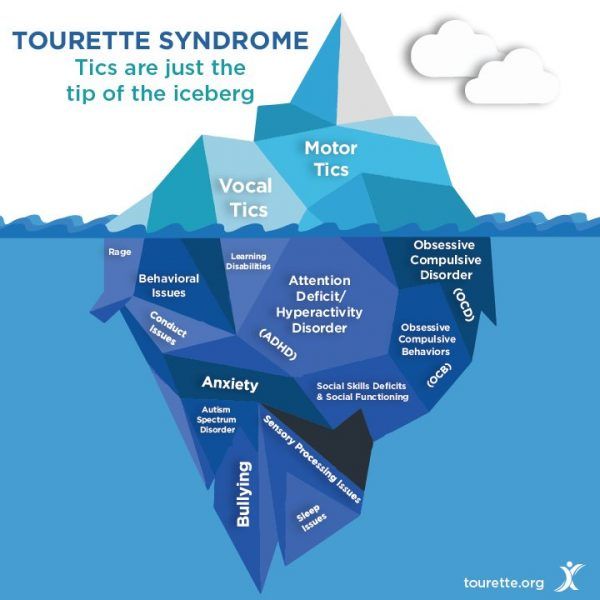Tourette’s Syndrome
Tics and tic disorders including Tourette Syndrome
Tourette Syndrome (TS) is a neurological condition that is estimated to have a prevalence of 1% (which is the same as Autism Spectrum Condition). This means one school child in every hundred will have it. TS is more prevalent in boys and the main symptoms are physical and vocal tics, which typically develop in childhood. Tics can be simple such as eye blinking, sniffing, and throat clearing; through to complex movements and vocalisations (such as shouting phrases, skipping, and throwing). Symptoms wax and wane, and factors such as stress and excitement can affect frequency and severity of tics.
Clinicians use the American Psychiatric Association Diagnostic and Statistical Manual (DSM-5) to define what TS is. This manual suggests that the average tic onset age is between four and six years. However, some researchers have suggested onset could be much younger, from three to eight years old. There does seem to be a peak in tic severity around 10 and 12 years, too. For TS to be diagnosed, multiple motor tics and at least one vocal tic must be present for at least 12 months. TS can only be diagnosed by observing and evaluating symptoms. Rating scales exist to help with the assessment of tic severity.
Co-occuring conditions
85% of people with TS will have additional symptoms as well as tics. These co-occurring conditions may include obsessive compulsive disorder (OCD), attention deficit hyperactivity disorder (ADHD), learning difficulties, depression, anxiety, sleep problems, and sensory processing difficulties. Sometimes people with tics report these co-occurring conditions can be more challenging to live with, rather than the tics.

What are tics?
One misunderstanding about TS is that it involves swearing (Coprolalia), whereas only about 10% of people with TS have this type of tic. It is thought that approximately half of children with a TS diagnosis will see a significant reduction in their symptoms as they approach adulthood. Many people experience a physical sensation – a premonitory urge/tic signal – before they have a tic. Once a tic has been performed the premonitory urge often reduces. For some people, multiple attempts of a tic are necessary until it ‘feels just right’ and the premonitory urge goes away.
Although tics are involuntary, many people are able to control their tics for a short time. A helpful way of understanding this is to compare it to blinking. It’s possible to keep your eyes wide open and avoid blinking for a short period of time, and with practice you will get better at doing it for longer.
This technique is used in behavioural therapy where someone can learn to control and manage their tics while understanding more about their tics and accepting them. In the ‘European clinical guidelines for Tourette Syndrome’, behavioural treatments for tics are recommended as the first line for both children and adults. However, accessing healthcare professionals who are trained in delivering behavioural therapy can be difficult, and therefore medications are often used to help control bothersome or painful tics. Online training in behavioural therapy for tics for healthcare professionals is available.
Impact and resources
The impact of living with TS will vary as the condition is unique to each individual and ranges across a spectrum. Tics can be very painful, and in some cases can cause harm or injury. Pain from tics, stigma, social isolation, and other aspects of tics can have an effect on people’s mental health. Being in school as a young person with tics can also produce challenges to concentration levels, with certain tics having a direct impact on reading and writing. Being ‘different’ can be a source of anxiety for young people with TS, and sometimes bullying is a problem. Information and education around what tics and tic disorders are can be greatly beneficial, resulting in more tolerance and understanding in the classroom.
There are resources and information available in English about tics and Tourette Syndrome by the Tourette Association of America and Tourettes Action in the UK.
There is some Belgian support available for people who have tics or a tic disorder like Tourette Syndrome. Iktic/Jetique is the Belgian Tourette Syndrome patient association. Iktic is the Flemish side of the association: they are launching a new French-language branch of this association for the French-speaking community in Belgium. The website will also be multi-lingual and will have resources in English. The aim of Iktic/Jetique is to help people with TS get the practical support and social acceptance they deserve. Information and advice in French and English language options will be available soon on the Iktic/Jetique website.
© Dr Seonaid Anderson, May 2022
Research psychologist & neurodiversity consultant
https://www.neuro-diverse.org/

